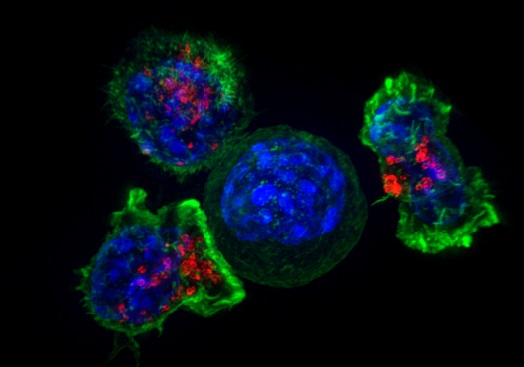
Killer T cells surround a
cancer cell. Source:
National Institutes of Health.
Creators: Alex Ritter,
Jennifer Lippincott Schwartz,
and Gillian Griffiths
Fanconi anemia (FA) is a rare inherited disorder characterized by progressive bone marrow failure and an increased risk of developing certain types of cancer. The FA pathway consists of a network of 21 proteins that is specialized for repairing DNA inter-strand cross-links. Identification of monoubiquitylation (or similar) defects in this network provides an opportunity for therapeutic targeting with a high-throughput, quantitative mechanism. CPTAC investigator Dr. Amanda Paulovich and her research team at the Fred Hutchinson Cancer Research Center demonstrated the utility of an immuno-multiple reaction monitoring (iMRM) assay to quantify the unmodified and monoubiquitinated protein isoforms and peptides unique to FANCD2.
As reported in DNA Repair, the investigators analytically characterized the iMRM assay using fit-for-purpose method validation to determine assay performance, followed by proof-of-principle experiments using human immortalized cell lines and FA patient primary human T cells treated with the DNA cross-linking agent mitomycin C (MMC). The quantity of the monoubiquitinated protein isoforms detected by the iMRM assay is increased following treatment of human immortalized and primary human cells with the DNA cross-liking agent MMC. The assay is configured to perform precise, relative quantification of a surrogate peptide for the Fanconi anemia group D2 (FANCD2) protein in both unmodified and ubiquitinated forms. The assay can be multiplexed with other iMRM assays to comprehensively profile the DNA damage response in various sample types and conditions. These results show that the iMRM assay is a potential functional diagnostic tool for FA patients with defects in the upstream FA complex or FANCD2. The FANCD2 monoclonal antibody and characterization data for unmodified and ubiquitinated FANCD2 assays from this study are made publicly available on the CPTAC Antibody Portal and CPTAC Assay Portal.

